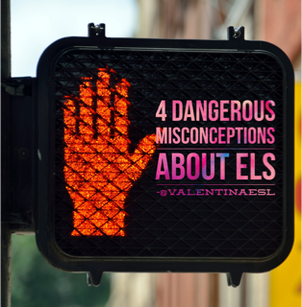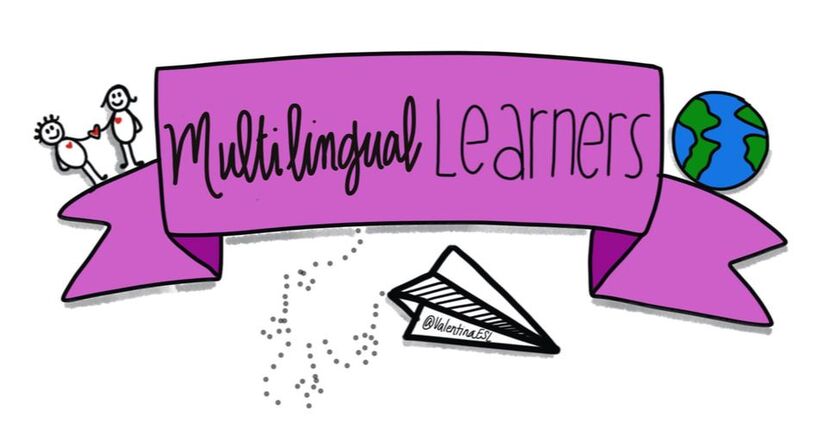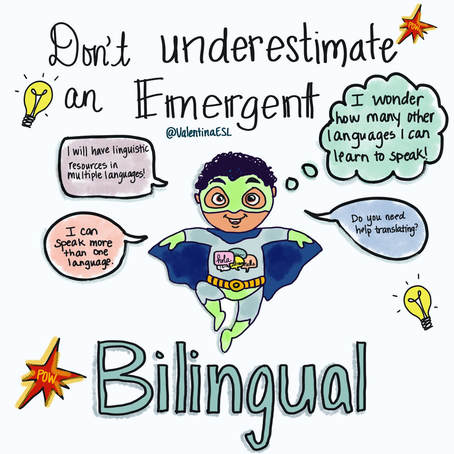|
Often I'm inspired to write by something I've encountered either through reading a professional book, visiting a campus or classroom, or through conversation (in person or online). This post was inspired by recent conversation online. Let me set it up for you.
A teacher wanted advice regarding a student she has who is new to the United States. The student's primary language is Spanish and the teacher is having difficulty serving the student in a main stream English classroom while also serving the other English only students. The teacher mentioned that she had yet to have a conversation with the student. Many other teachers responded giving advice. Some said it's impossible to help this child. Others said that the student first must learn English before she can learn grade level content. Some said the other students in the class will suffer if the teacher employs techniques to support the one beginner. This post was completely deficit based and many of the comments to it really touched a nerve. "I see no benefit in having her..." So if you feel that you're in a similar situation or you know someone who is, here's some advice:
7 Comments
 Those are YOUR kids. Fix them. One of the scariest things we can do is think that some of our students are someone else’s responsibility. When we embrace the understanding that “it takes a village” and that “we’re all in this together” our students will be better off. Our English Language Learners may be served by both a classroom teach and an ESL specialty teacher; however the ESL specialty teacher serves as a SUPPLEMENTARY teacher not as a replacement teacher. Every staff member that works with a child affects the child’s education…good or bad. I can't count on my fingers how many times someone has come up to me and asked me a question in Spanish. Then when I respond in English with... "I don't speak Spanish," I'm met with a puzzled and unpleasant look. A look that says, why don't you speak Spanish? You are clearly Hispanic.
Well, no...I'm not. People frequently ASSUME that I am Latina based on what they see and probably from my last name as well. Making assumptions about people is a dangerous thing. The only way to avoid or correct a misconception is to get to know people, ask questions, build relationships. Without this knowledge, we tend to make up our own stories about one another. Making assumptions about our students and their families is even more dangerous. When I was a kid, my parents rarely went to our school for conferences or other events. Chances are you probably have kids in your class with similar situations. Their parents are not coming to school functions. Why? I can only hope that the teachers didn't "assume" my parents didn't care. My parents, in reality, cared VERY much about my education. They actually cared so greatly that they left everything behind to move us to America so we could have a better education and future. If my teachers asked, they would have known that my dad worked a great deal of overtime so we could afford our little home. If my teachers asked, they would have known that my mom was still struggling to learn English, had an infant to care for, and didn't have an extra vehicle to drive. If my teachers asked, they would have known that my parents worked with me every night, instilled in me that school was of utmost importance, and read to me before bed each night. If my teachers asked... I will never forget my first few years as a young teacher. I taught in a wonderful school that was filled with great families and amazing teachers. There was just this one teacher who often said things about her students that didn't sit well with me. One day she came into where we were eating lunch as a team and she said with great unhappiness, "Well, I'm getting a new student. And the kids are hiding all their things because the new kid is Mexican." I was shocked and saddened. She didn't stand up for the new student who hadn't even stepped foot in her room yet. The poor child was already labeled and no one had even met him yet. Why? I have never been able to forget this. At the time, I was a baby teacher and she was a seasoned veteran. I didn't stand up for the child. Now, I would tell my young self to speak up and be an advocate for the student. This veteran teacher made terrible assumptions about an innocent child and allowed her assumptions to sway the thoughts of her other 20 students. What a shame. A terrible shame. Never assume that our students have experiences that we have. Even things we may think are basic and simple such as visiting a zoo. Don't assume all your kids have been to a zoo. Case in point...my niece was well into her teenage years before visiting a zoo. And sadly I didn't realize it until then either. I assumed she had been. When asking your class about experiences, think carefully about how you phrase the question. For example, don't say, "Who has never been to the circus?" It creates a singling out effect. It may embarrasses students who haven't had the experience. Also don't ask, "Does everyone understand?" It is rare that students who don't understand will actually answer by saying, "No". Instead ask specific, clarifying questions. We make assumptions at times. It's really human nature. The important thing to remember is that when it comes to our students, the better we are at getting to know them by asking them questions and being genuine, the better we will be at serving them the way they need it. When we understand who they are, where they come from and what their lives are like, we will be able to reach them in a way that is powerful. Connecting by building meaningful relationships allows our students to feel important, valued, and part of their own growth in education. |
Categories
All
|


 RSS Feed
RSS Feed
